
the MAM: greek ladies
RETURN TO MYTH ABOUT MYTHS PAGE
While the heroes of mythology were very often a group of men, there was a lot to be said about the various daring women of myth who fought alongside these heroes, fought for their own gain or orchestrated horrors and monstrosities of their own. They were strong-willed sorts and tenacious enough to live during a time that favoured them very, very little.
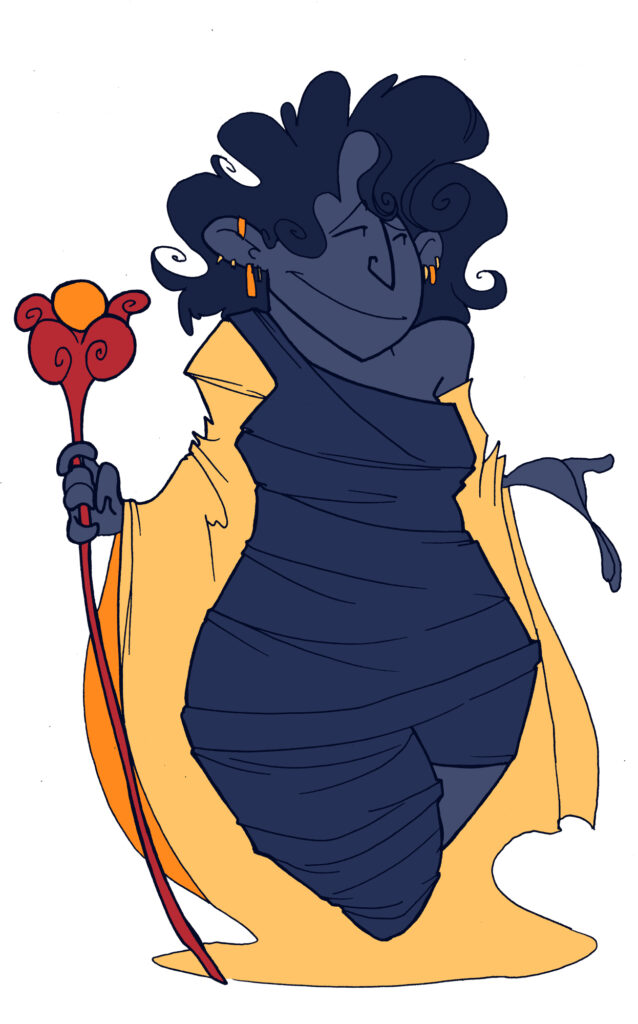
kirke
(CIRCE)
Best known for being a nymph, a titaness and much later, a witch.
In some versions of the myth Kirke was the daughter of the titan Helios and the nymph, Perse. Her siblings were nearly equally famed as she was: Aeetes, Perses and Pasiphae. She was sometimes considered the daughter of Hekate wince the two shared a vast knowledge in witchcraft. She often was confused with Kalypso though ther two were not the same in the least.
It was said the Kirke lived on an island called Aiaia, in a mansion in the middle of a forest clearing. It was said that the wild animals surrounding her home were extremely docile, odd considering they were lions and wolves. It was said that they were the drugged victims of her sorcery. It was said that she used to turn the men who landed on her island into pigs and that their howls and sqeals could by heard by passing ships in a quite ominous fashion.
Here, Odysseus landed, his ship stranded on her island, his men were turned to swine as well but Odysseus himself was intercepted by Hermes giving him a word of caution. Odysseus followed Hermes’ advice and perhaps fell for the witch during his stay because Kirke had invited him to rest on her island for an entire year before she gave him advice on how to reach home in two directions, both seemingly equally as dangerous. Kirke had also been visited by the gods and told of a prophecy in which Odysseus was to go to the Underworld and instructed him on this path as well. It was said that after his stint to the Underworld, Odysseus returned to Aiaia for a small moment of recuperation before setting off back to Ithaca, his home.
Later, Kirke gave birth to his child (or three children depending on the story), and raised him well enough. It was said that once her son, Telegonus, knew of his estranged father, he was set to find him. Kirke gave him a poisoned spear to protect him and sent him on his way. It was said that Telegonus accidentally killed Odysseus. Apparently, he also invited Penelope and her son to come home with him. Which they agreed to.
The ending of Kirke’s myth suggested that she was rather fond of the newcomers, so much so that she made them immortal, in some cases she even brought Odysseus back to life which spurred new drama in that he married his son (by Penelope) to Kirke’s daughter and later his son (by Penelope) would kill Kirke for some unexplained reason in which it would end with Odysseus killing himself once more.
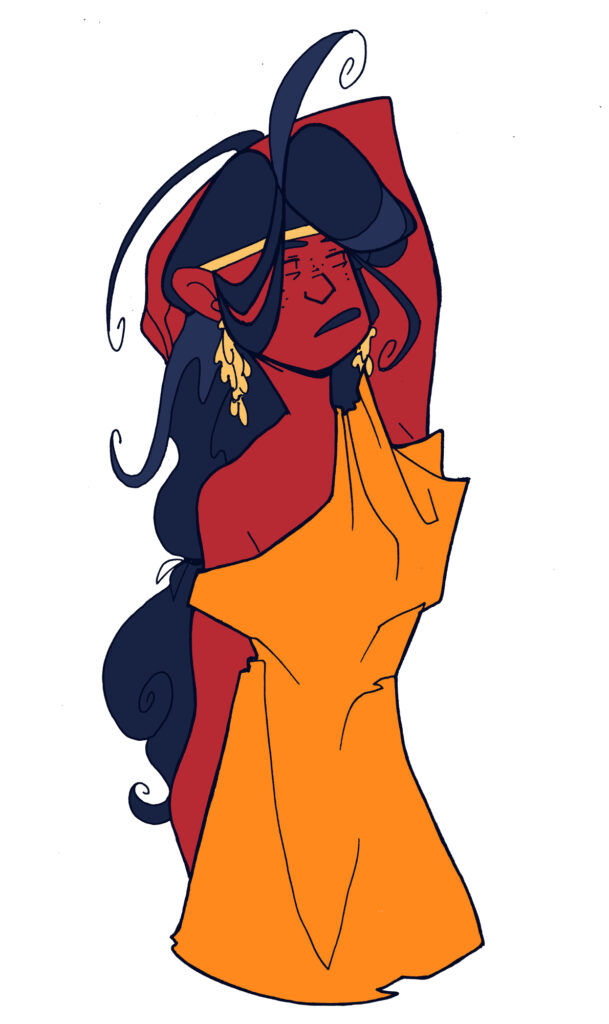
helen
(HELEN)
Best known for being a direct cause of the Trojan War.
In some versions of the myth it was said that Helen was the most beautiful woman in the entire world, the daughter of Zeus and Leda (sometimes Nemesis). On some accounts she was created as a guise to take out part of man-kind which was not entirely a dismissable moment considering the effect she had on men and how their lust and jealousy started the Trojan War. Some accounts explain that Helen was a much more morose character and miffed by her pursuits of suitores and frequented abductions. In others Helen revelled in this carnage she caused with the entire war and was said to have had Bakkhos-worshipper tendencies of being slightly mad.
Helen was initially abducted by Theseus who had sought out to kidnap and marry daughters of Zeus along with a friend of his. Helen was later rescued by her twin brothers who brought her back to Sparta where she had an insane amount of suitors awaiting her hand in marriage. It was said that in some versions, Helen’s father was the one to choose her husband, in others that Helen hosted a competition so that the best warrior would win her hand in marriage. In both instances, Helen and her father were worried that an all-out brawl would ensue, Odysseus suggested that the rest of the suitors make a law-abiding oath in which they all must serve the winner. This worked and Menelaus was deemed her husband, he and Helen ruled Sparta.
There were many variations as to the abduction of Helen by Paris. In perhaps the more favourable instance, Helen was wooed by Paris who won her heart when he was visiting as an ambassador for Troy. Helen was enamoured by him and so perhaps snuck away with Paris to Troy. Naturally, Menelaus didn’t take well to this and called upon the help of all Helen’s suitors, hence beginning the entire war on Troy. It was said that during the war, Helen had affections and fell for Hektor who was a far better warrior than Paris. Paris and Hektor were both killed in battle, however, and she was then paired with Deiphobus. It was also said that when the Greeks built their giant wooden horse, Helen had let them enter, leading a chorus of Trojan women. In another version it was said that she circled the horse three times, imitating the voices of the women the warriors left back home, torturing the men inside it. By the end of the war it was said that Menelaus attempted to strike her with his blade but she dropped her robe with a little wink and won him back over with her amazing looks.
After Troy, Helen was said to have had very many different fates which was unsurprisng considering the contradictory already. Two of her fates were rather nice considering her already quite adventurous life. The first included Helen remaining with Menelaus, neither of whom held a grudge, Menelaus moved on from his petty anger and Helen was able to tell her fantastic stories of her adventures in Troy without trouble. In another version, as soon as she was ‘rescued’ by Menelaus, Apollo pulled her from the mortal world and allowed her to rest peacefully beside Akhilles.
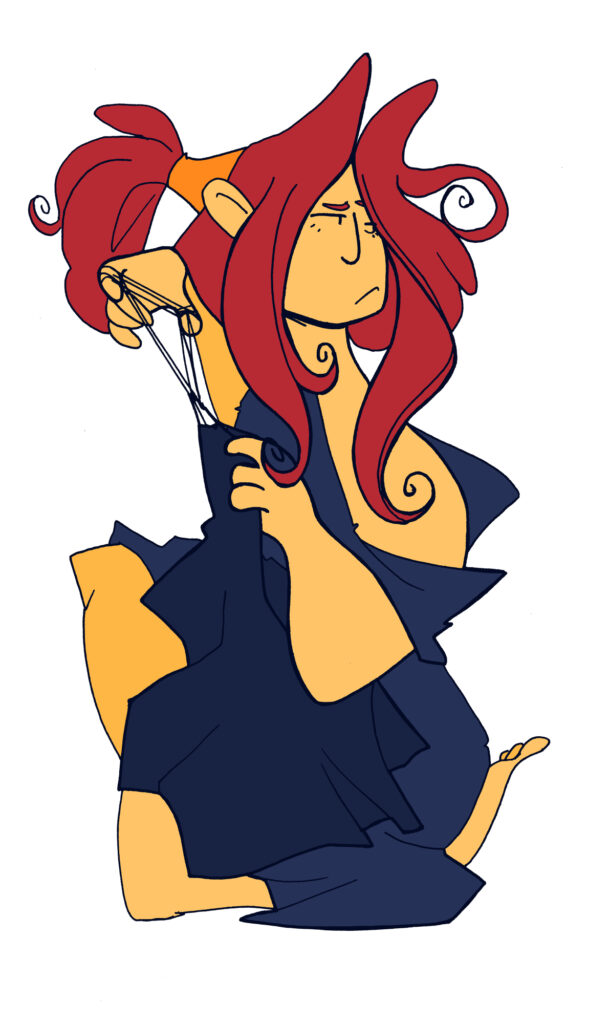
penelope
(PENELOPE/PENELOPEIA)
Best known for being a Queen of Ithaca.
In some versions of the myth Penelope was rather brilliant. Once Odysseus set off to fight in the Trojan war, a great deal of suitors wished to marry her and insisted that Odysseus was going to die in the war, so naturally, someone ought to take care of her. Penelope was really rather fond of her husband and honestly didn’t care at all for these new suitors. She devised a plan in which she told them that she would consider marrying to a new suitor only once she finished making the shroud for Odysseus’ father. Only then would she consider it. Seemingly rather reasonable a request, many of the suitors agreed to this.
At night, Penelope would unravel her day’s work. She did this for nearly twenty years… until one of her maids rudely informed her suitors of her trick. Having been caught and having enraged the suitors in doing so, she came up instead, with a game. She had her suitors perform the task of stringing and using a bow. Odysseus in disguise, did this and succeeded while everyone else failed. It was said that he also killed all her suitors and he and Penelope lived happily ever after… for the most part.
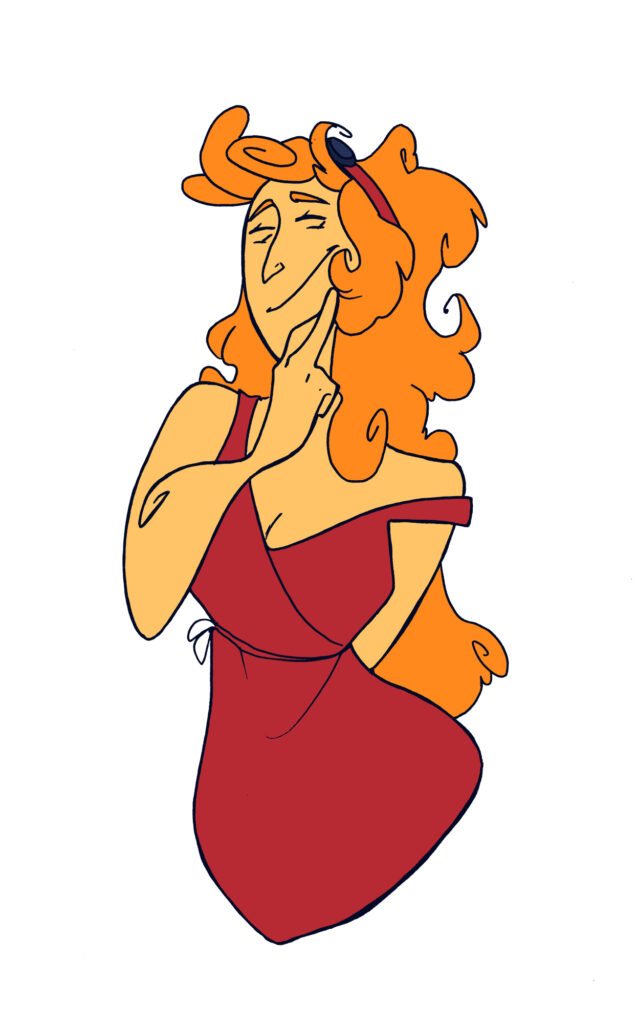
kalypso
(CALYPSO)
Best known for being a nymph residing on the island of Ogygia.
In some versions of the myth Kalypso was most infamously known for luring Odysseus to her island and holding him captive for seven long years. It was said she offered him and begged for him to become her immortal husband. She enchants him with dances and song and weaves on her loom with a golden shuttle, perhaps hypnotizing him in the process.
Eventually, Odysseus managed to remember the fact that he still had a wife waiting for him back home. He begs his patron goddess, Athena to be set free, who then demands Zeus that Odysseus be set free, who then asks Hermes to talk to Kalypso and gently ask her to set Odysseus free.
At length the nymph agrees only because she was told that it was not Odysseus’ fate to stay with her for all of eternity. Disgruntled, she ensures Odysseus has enough supplies to get him home.
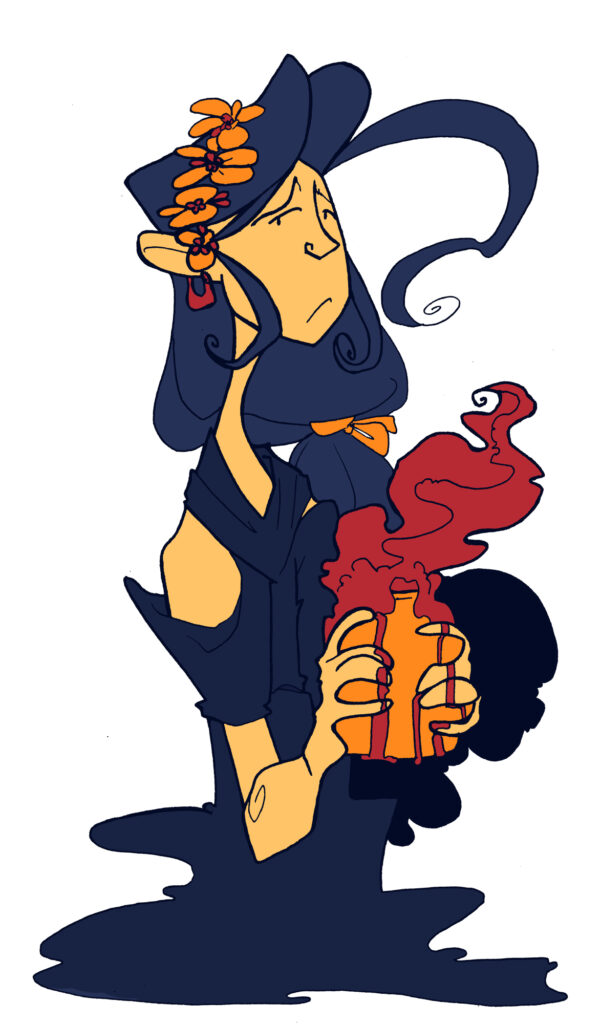
pandora
(PANDORA)
Best known being the first woman and for having a jar containing all the world’s good and evils trapped inside.
In some versions of the myth, Pandora was considered the greatest evil of all… because she was a woman. Writers in antiquity were fraught with their own prejudices against women and so Pandora suffered as a character from this. Pandora, herself, wasn’t inherently good or evil, she wasn’t even the character who opened the jar.
It was said that Pandora was claimed to have been made at the request of Zeus by Hephaistos and endowed with various gifts by: Aphrodite (beauty), Apollo (music), Hermes (persuasion). She was then given as a gift to Epimetheus, despite his brother having told him not to accept gifts from Zeus. Epimetheus was the culprit to having opened the jar, releasing various evils into the world.
However, there is some speculation that while newer versions of the myth suggest the only thing left in the jar was ‘hope’, the ancients believed it was something far worse.
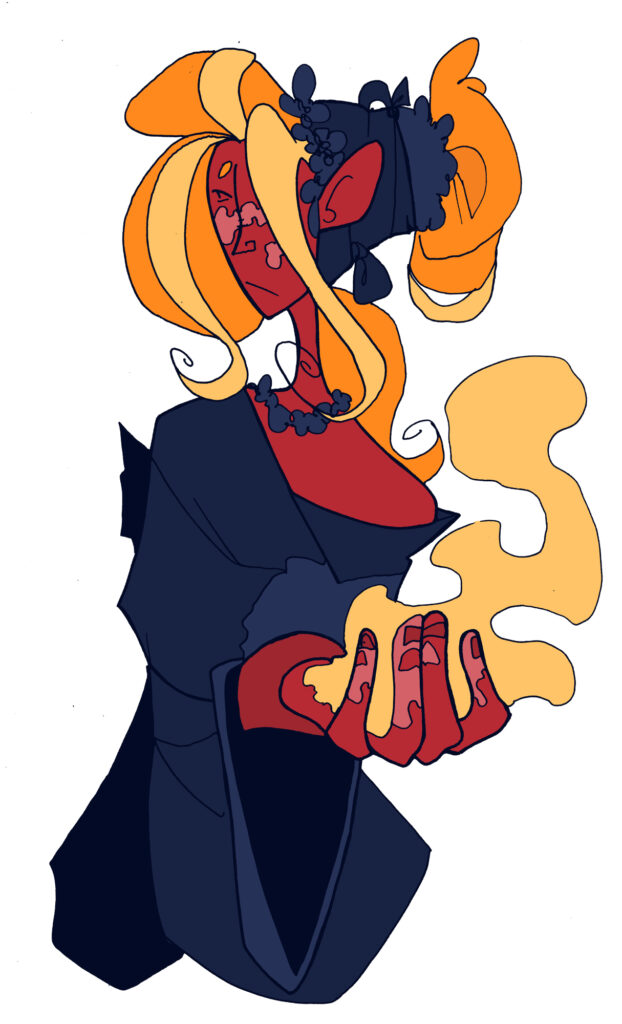
medea
(MEDEA/MEDEIA)
Best known for being an enchantress and prophet.
In some versions of the myth Jason came to Colchis in search of the golden fleece so that he might claim his inheritance to the throne. King Aeetes, already in posession of the fleece, promised to give it to Jason should he complete various tasks. Having caught a glimpse of him, in the meantime, Medea fell in love. Medea promised to help Jason on the account that he would marry her if she did so. This meant that Medea could foresee various pitfalls and use her powers of enchantment to help Jason succeed in his tasks. He succeeded.
Naturally, King Aeetes was not pleased with the idea of Jason not only obtaining the fleece but also his daughter. He refused to let them go until Medea came up with the distraction of killing her brother, scattering his limbs on an island so that the kingdom would be stuck looking for all these pieces and perform a proper funeral before setting off to find her.
Medea afterward sought to be purified of her actions in killing her brother via her aunt Kirke who was a well known witch.
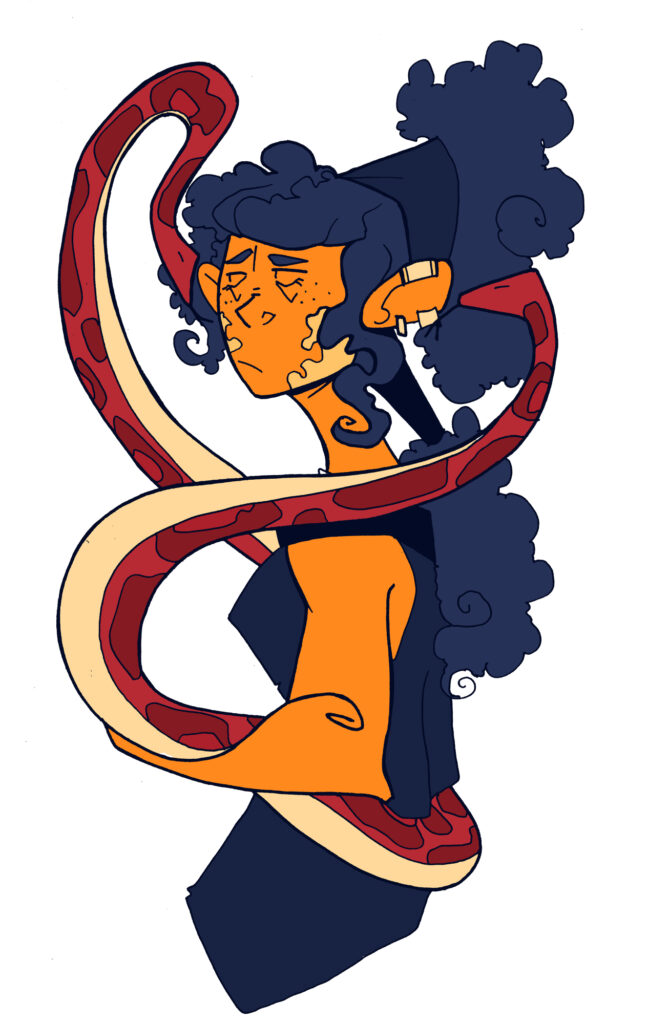
kassandra
(CASSANDRA/ALEXANDRA)
Best known for having been a prophet that nobody believed in.
In some versions of the myth, there were two main iterations. The first: in which Apollo fell for Kassandra and granted her the ability to see the future out of love and adoration for her. Unfortunately, Kassandra was most comfortable seeing Apollo in a friendly manner and refused any advances he made. Apollo, not so comfortable with rejection, cursed her so that nobody would ever believe her visions. This included the vision in which Kassandra saw the war on Troy happening. Despite her warnings the war went on.
In the second version the outcome is the same but it was said that Kassandra visited Apollo’s temple and a couple of his snakes licked her ears, allowing her to listen to the future. Unfortunately this story may have seemed so odd and impossible, she wasn’t at all believed by her peers.
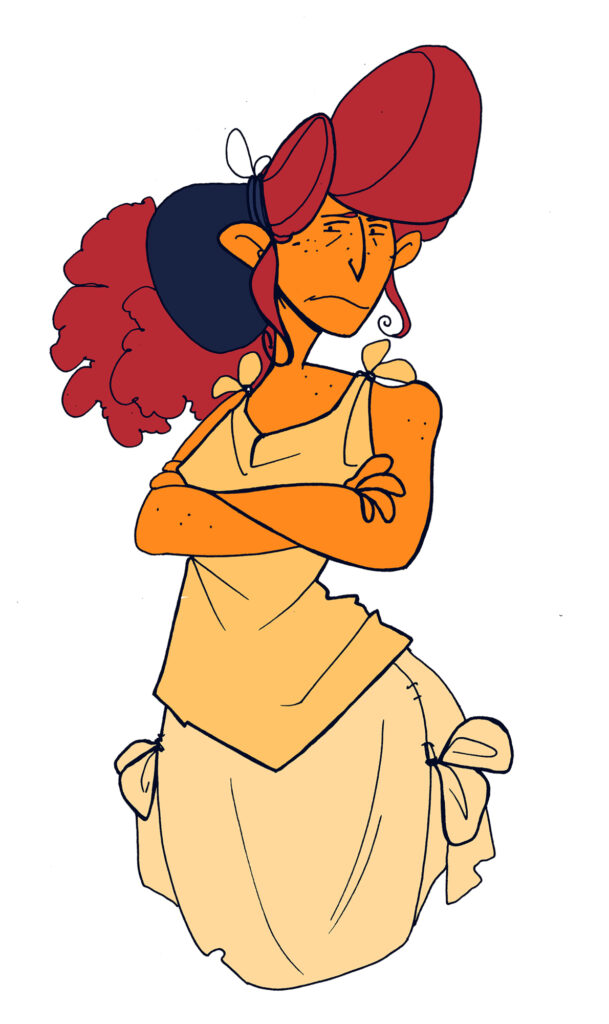
andromeda
(ANDROMEDA/ANDROMEDE)
Best known for being a sacrifice.
In some versions of the myth she was made a sacrifice to a sea monster after her mother, Cassiopeia, boasted that her daughter was so much prettier than the nereids who were nymphs that were daughters of Nereus. Nereus was a sea god who often accompanied Poseidon, and he very much didn’t take well to this sentiment. In order to satiate his friend’s frustrations and anger, Poseidon sends a sea monster (Ketos) to ravage Andromeda as punishment. The princess was chained to a rock, naked as an intended sacrifice before she was saved by Perseus. Afterward, Andromeda followed Perseus on his grand heroic adventures and helped him along the way.
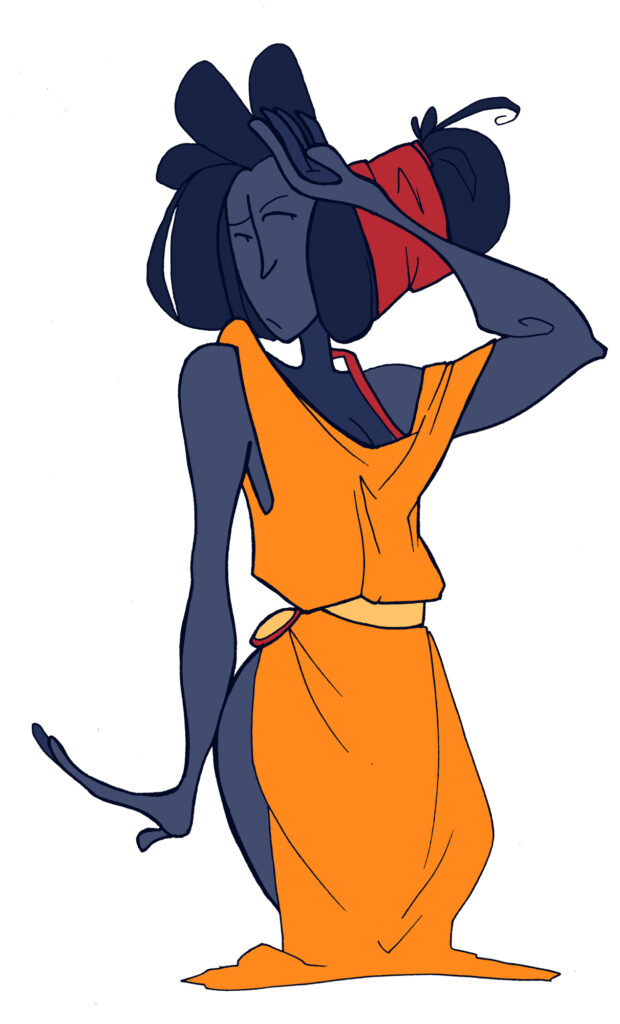
europa
(EUROPA)
Best known for being abducted by a bull.
In some versions of the myth, Europa was considered quite so beautiful as to attract the affections of Zeus. The god, having the great need to get much closer to her, disguised himself as bull among her father’s herds. It was said that she was picking flowers with her helpers at the time and, upon noticing the bull, caressed it. Noticing its, perhaps, rather docile behaviour, Europa got onto his back and this was when Zeus took the opportunity to run. With her still on his back he swam to Crete where she was made the first Queen. Zeus then showered her with various gifts: a necklace made by Hephaistos, Talos (a giant bronze automaton set to protect her), Laelaps (a dog that caught everything she hunted) and a javelin that never missed.
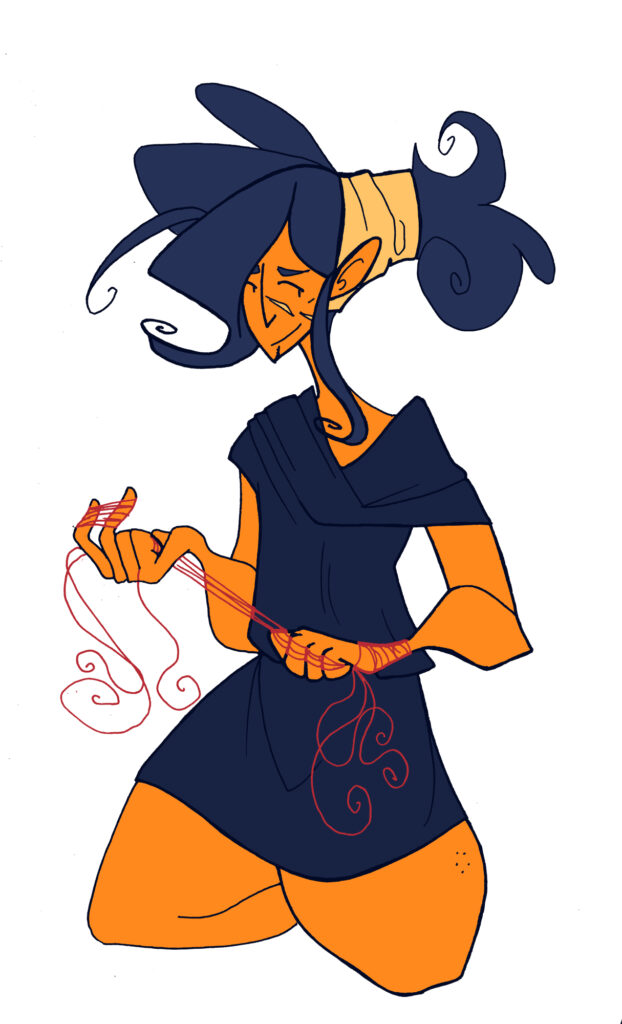
ariadne
(ARIADNE)
Best known for having had the idea to use thread in the minotaur’s maze.
In some versions of the myth Ariadne was said to have been in charge of the great labyrinth housing the minotaur and the sacrifices given to it. It was said that she fell in love with Theseus at first sight and gave him his sword and a ball of thread so that he could make it out of the maze alive. Ariadne made him promise that, should he survive the maze and defeat the minotaur, he would marry her. Theseus agreed.
After succeeding, Theseus had Ariadne follow him on his grand adventures, unfortunately for Ariadne, her new husband wasn’t very intelligent. He forgot Ariadne on an island where Dionysos was known to reside. Dionysos, upon spotting her, was in such awe he offered to marry her then and there. In some versions, here she may have also been given immortality.
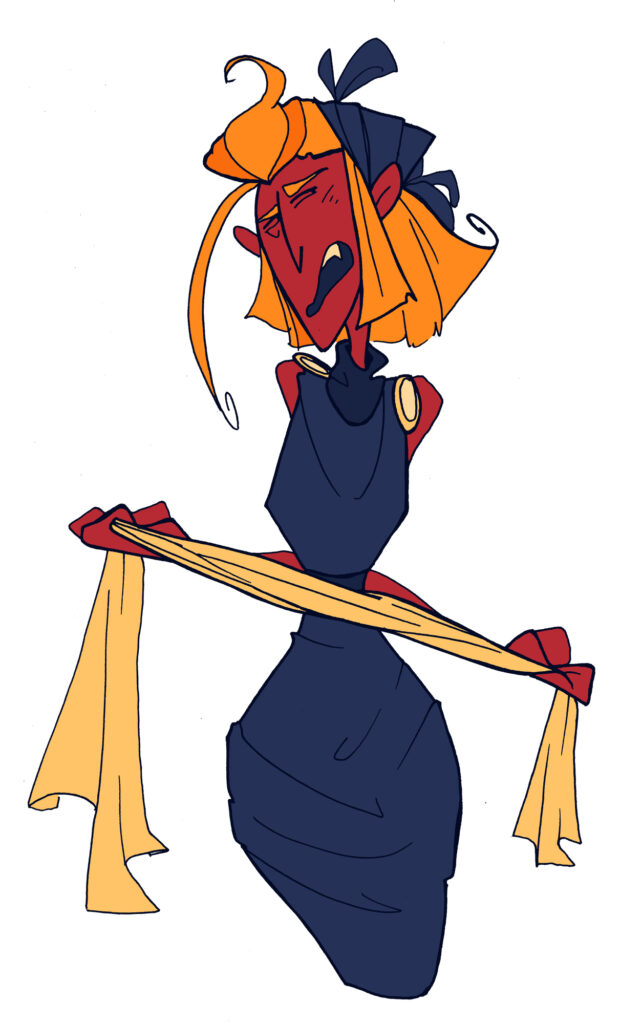
arakhne
(ARACHNE)
Best known for being an amazing weaver.
In some versions of the myth she boasted that she was the best weaver around, even more-so than Athena. The goddess took this personally and challenged Arakhne to a weaving challenge where the loser would not be allowed to weave ever again. Some versions said that Arakhne she won against Athena and while the goddess was in awe of her work, she cursed Arakhne with so much guilt that caused Arakhne to hang herself. Athena then felt bad for it, so she brought Arakhne back as a spider.
The other version told the tale of how Arakhne lost and Athena took pity on her losing (since she would never be allowed to weave again). The goddess figured turning Arakhne into a spider would make her happy since she could still weave even if her weaving was now webs.
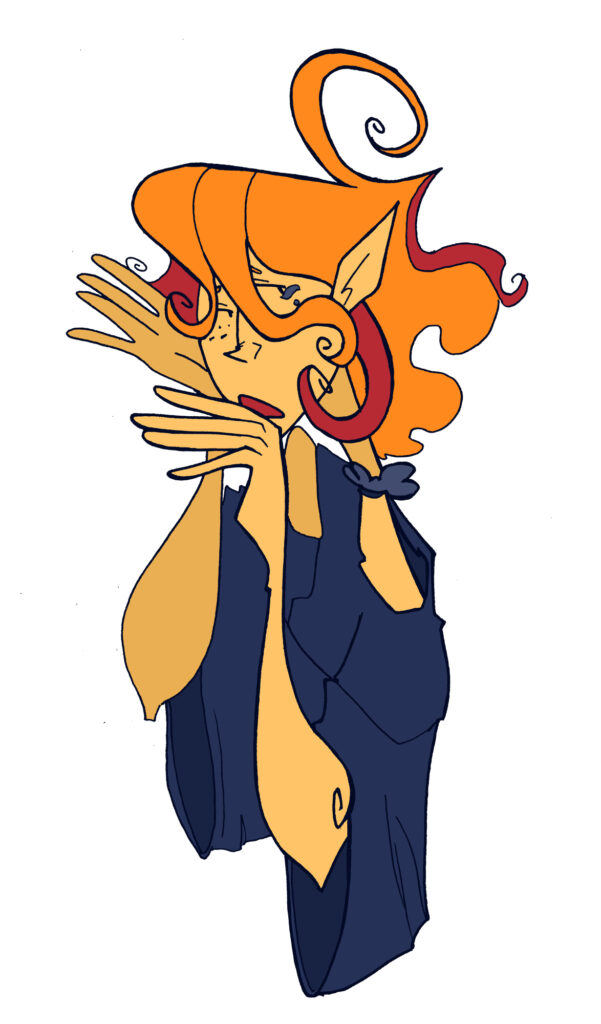
ekho
(ECHO)
Best known for being the nymph who fell for Narcissus.
In some versions of the myth Ekho was in the habit of sleeping with Zeus from time to time and was eventually found out by Hera who cursed her. This curse involved Ekho being unable to speak save for the last few words someone else had already spoken.
It so happened that Ekho, wandering the woods one day, fell upon the most handsome man she had ever seen, Narkissos who was busy hunting. Ekho fell deeply in love with him, remaining hidden and watching him from a distance she eventually plucked up enough courage to call to him and could only repeat his very own words. This caused a great frustration in the hunter who demanded she show herself.
Once Echo had, and professed her love for him, she was completely rejected, causing her to flee in her despair.
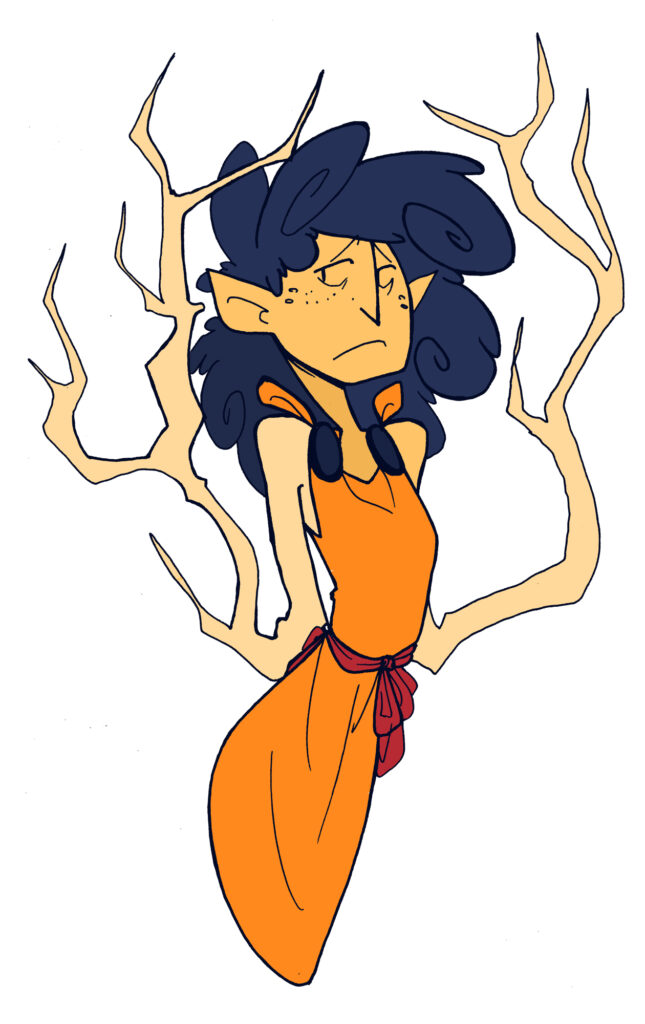
daphne
(DAPHNE)
Best known for being the nymph that was turned into a tree.
In some versions of the myth it began with a spat between Eros and Apollo in which Eros struck Apollo with one of his love arrows. The start of the debacle began with Apollo thinking it rather funny to tease and demean Eros for his wings? His bow and arrow? His responsibility over love and affections? It wasn’t clear.
This arrow, fired, caused Apollo to fall madly in love with Daphne to the point in which he chased her down in the most unrelenting sort of way. In her great annoyance and legitimate fear she prayed to her father and to Gaia for the chase to end. Unfortunately for her, their solution was to transform her into a Laurel Tree.
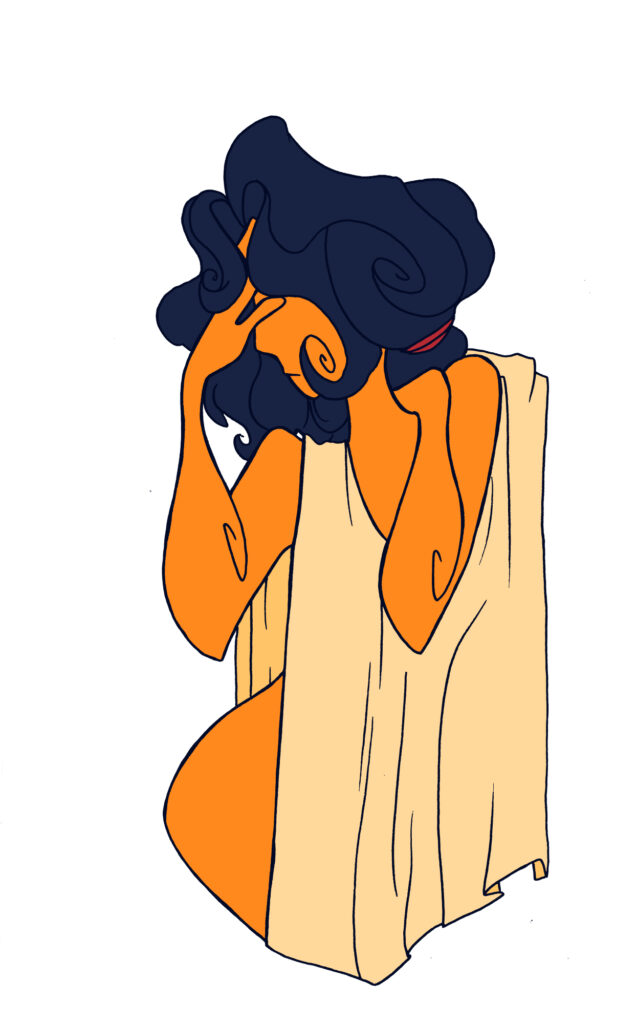
danae
(DANAE)
Best known for being trapped in a bronze container.
In some versions of the myth, an oracle told her father that Danae would give birth to a boy that would one day usurp him. So he did the only natural thing he could have thought of. He locked her up in a bronze chamber never to see the light of day. To add salt to this wound, Zeus appeared as a golden rain and used this rain to impregnate Danae with Perseus.
Fraught with distress, after Danae had this child, her father nervously locked her and her son this time in a crate before tossing them out to sea where they washed up on a remote shore. Here they lived rather decent and quiet lives.
It was said also that justice was served when Perseus lived out the prophecy and did, indeed usurp the king/Danae’s father by killing him, no less.
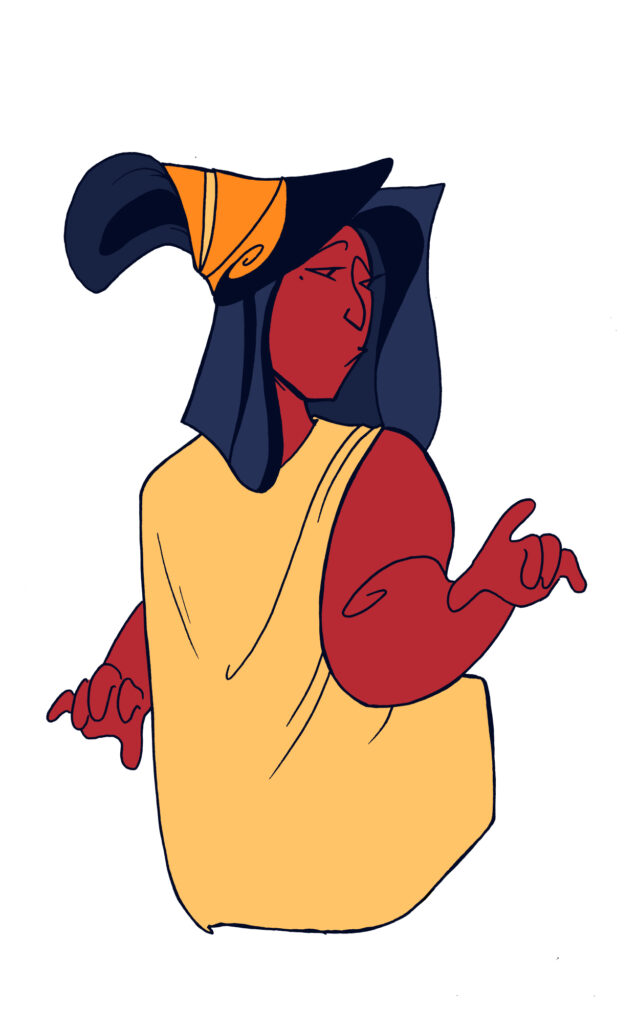
pyrrha
(PYRRHA)
Best known for being one of the woman… ever.
In some versions of the myth, her and her husband Deucalion were spared from the great flood that was caused by the gods in order to eliminate the Bronze Age. After this flood, the two walked about for a long time, attempting to find other people who might have survived it. Instead, the stumbled upon a shrine/oracle (most often of Themis) who told Pyrrha and Deucalion that, in order to recreate mankind, they must ‘throw their mother’s bones over their shoulders’. The riddle, quite tricky took Pyrrha to eventually figure out that ‘bones’ were referring to the rocks and the ‘mother’ was Gaia. Together, Pyrrha and Deucalion tossed rocks over their shoulders so that when these rocks hit the ground they shifted their shape into more humans.
In other versions, perhaps far later, Deucalion is the one who took credit for figuring out the riddle.
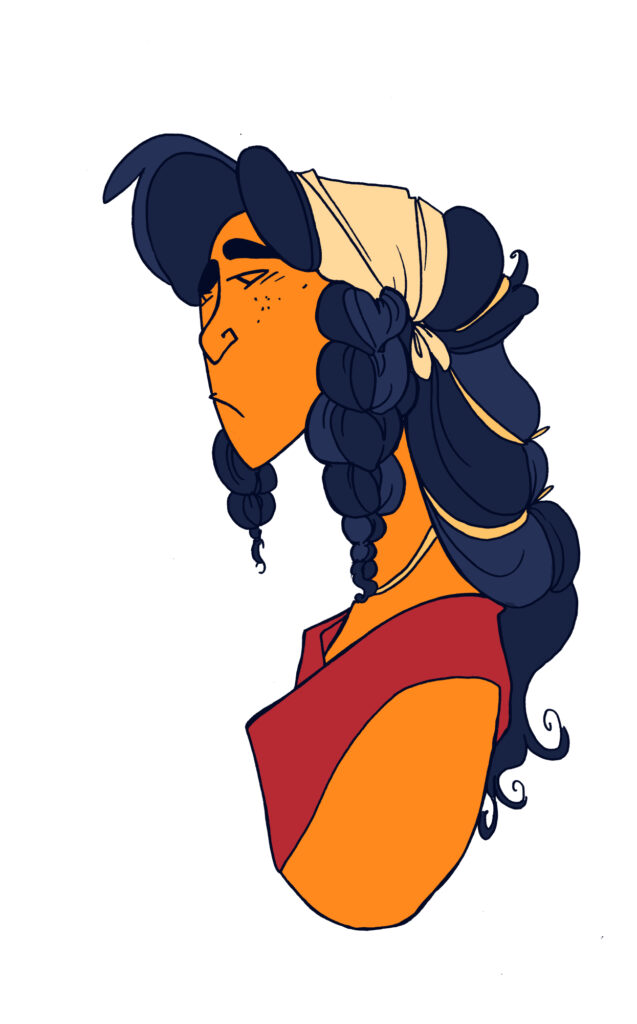
myrrha
(MYRRHA/SMYRNA)
Best known for having turned into a Myrrh tree.
In some versions of the myth… Myrrha fell in love with her father. It was said that her love rang so true and so earnest that she had a servant help trick him into sleeping with her. This trick happened several times, until, he finally figured out and, appalled, he chased her out of his home. Because of all this sleeping around, she was pregnant and with nowhere to go she prayed to the Gods to have mercy and help her.
Naturally, the gods did not respond all that kindly to her prayers and their solution was to turn her into a Myrrh tree. It was said that as a tree she gave birth to Adonis and that the smell of the tree came from the salt of her tears.
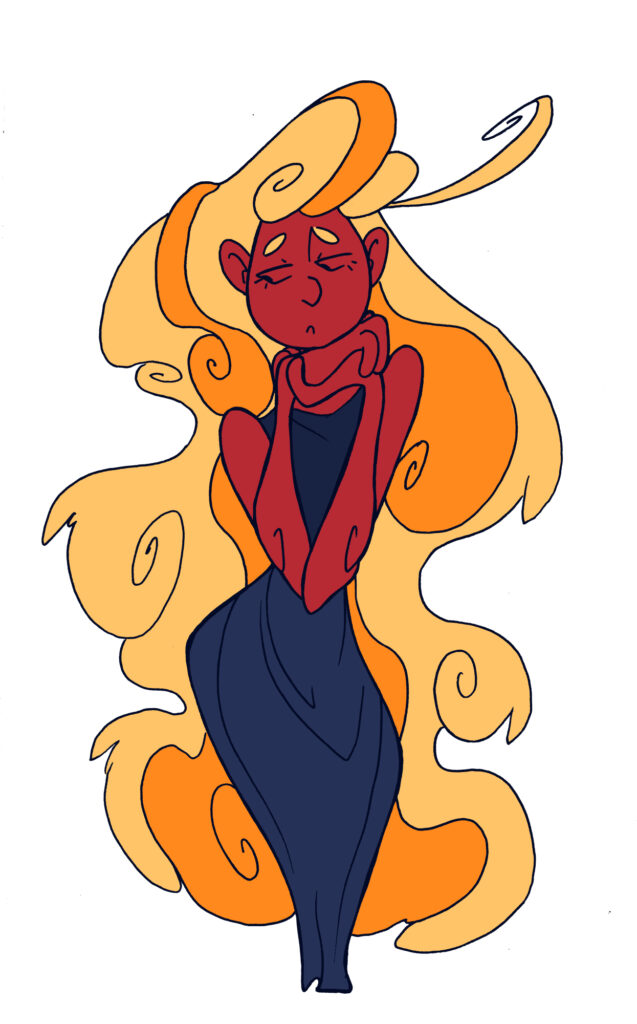
evadne
(EVADNE)
Best known for being the daughter of Poseidon.
In some versions of the myth, while Evadne was the daughter of Poseidon, she was actually raised by Aepytus (a king) and one day was absolutely appalled by her very sudden pregnancy. Not knowing who her lover was, Aepytus ran to Delphi, seeking the Oracle’s advice.
In the meantime Evadne was so ashamed of her child, she gave birth to it in the wilderness (luckily with the help of Eileithyia and the morai sent by Apollo) and left the child there to die.
Five days later, Aepytus returned from his voyage to Delphi and now knowing this child was actually the son of Apollo and was said to become a prophet of his own, quickly demanded that Evadne retrieve him from where she left him. Luckily, Iamos remained in the same patch of violets she left him in, surviving of the honey of bees sent by Apollo himself.
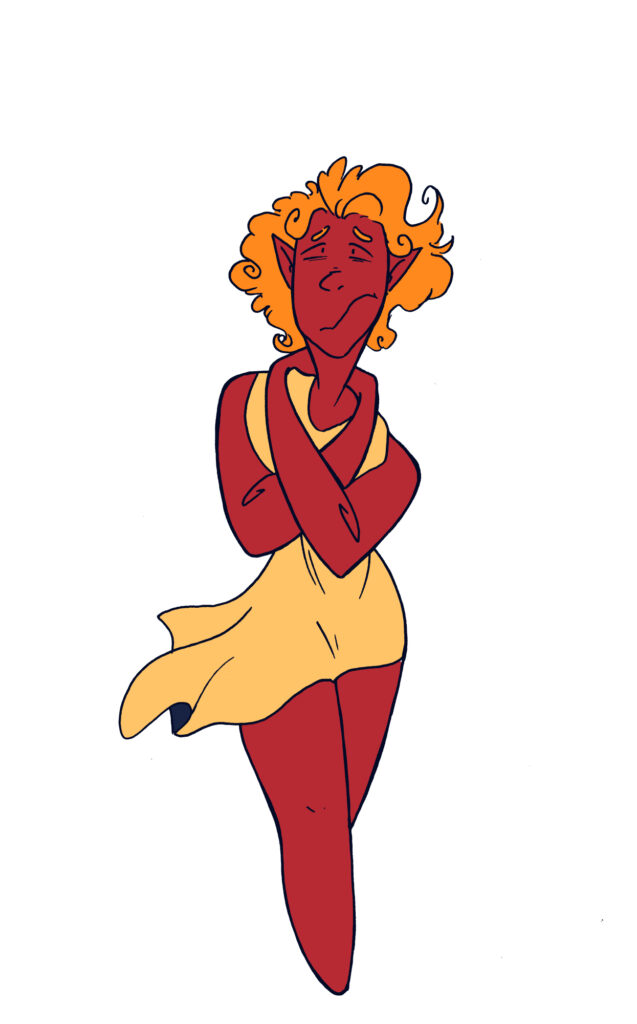
moria
(MORIA)
Best known for being a naiad-nymph.
In some versions of the myth, it was said that her brother touched a serpent and was quite viciously attacked by it (suffocated to death) while Moria watched, too afraid to get involved.
Luckily she spotted a Giant nearby and begged him to help her with this whole mess and he decided that he would. He pulled the snake from her brother, oddly by smacking it with a tree trunk and somehow not destroying her brother in the process.
The snake died and its mate revived it with a magical herb that Moria also used to revive her brother. If only everything were that easy.
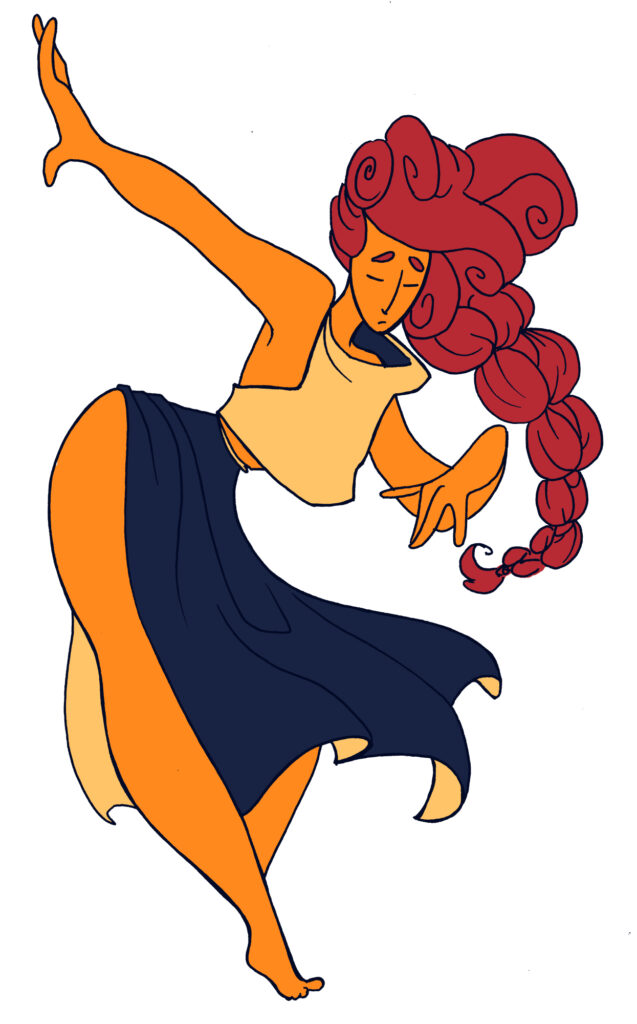
dryope
(DRYOPE)
Best known for being one of Apollo’s consorts.
In some versions of the myth, Dryope was not considered to have the best luck. Some of the various other nymphs taught her how to sing and dance which, really unfortunately, caught the attention of Apollo.
Dryope rejected his advances and, not knowing what else to do, Apollo turned into a tortoise so that she would hold and pet him only to have him turn into a snake and ravish her in that fashion. She gave birth to his child and created a temple in his name where she became a priestess.
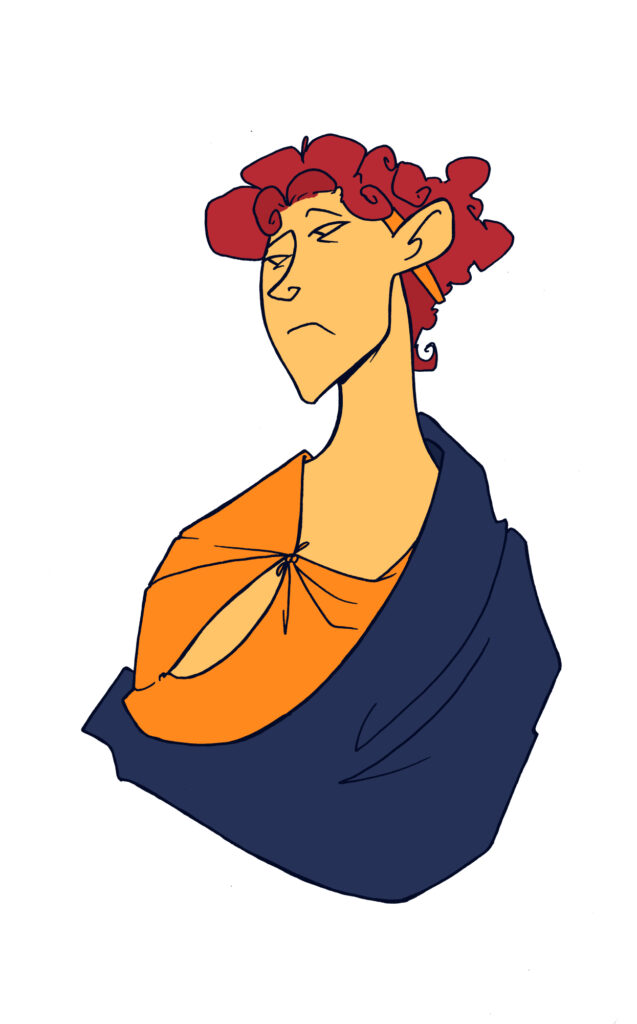
antigone
(ANTIGONE)
Best known for being Oedipus’ daughter.
In some versions of the myth, after her father committed suicide, her brothers earned the throne as heirs. This meant that Antigone was made to watch on the sidelines as her favourite brother was cast out and/or killed by her two other brothers. It was said that due to this, a war ensued, Antigone continued to watch while the remaining brothers fought and one of them won. It was said that the winning brother buried his opposing brother (arguably his favourite) and refused to give Antigone’s favourite brother a proper burial. Despite her pestering about both brothers receiving proper burials, she was ignored. Antigone instead took the responsibility upon her own shoulders and performed a proper burial herself. After having gone behind the new King’s wishes, he locked Antigone away in a tomb where she eventually killed herself.
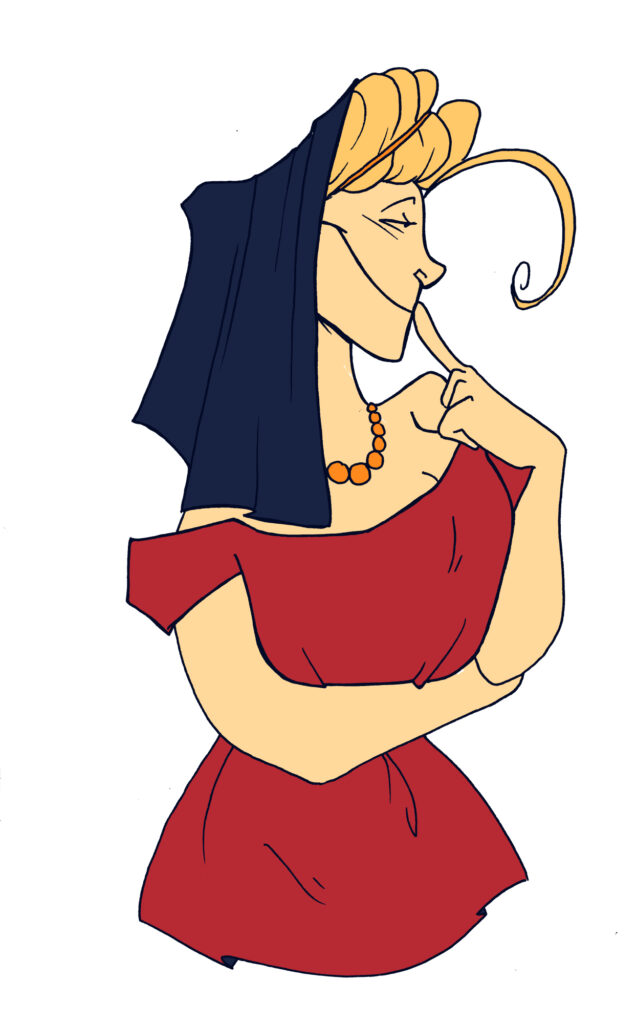
niobe
(NIOBE)
Best known for being a hubristic princess.
In some versions of the myth, Niobe made fun of Leto, mocking her with the fact that Niobe was capable of having fourteen children and Leto was only able to conceive twins; Artemis and Apollo.
To no surprise, this sentiment really enraged Leto’s own children who were really upset at a mere mortal laughing at their mother. The two teamed up to brutally murder all fourteen of Niobe’s children in which Artemis murdered her daughters and Apollo her sons.
Distressed and upset, Niobe’s husband killed himself and Niobe ran as far as she possibly could manage, sitting at the top of a mountain to cry her woes away. It was said that she turned to stone, set to weep there forever.
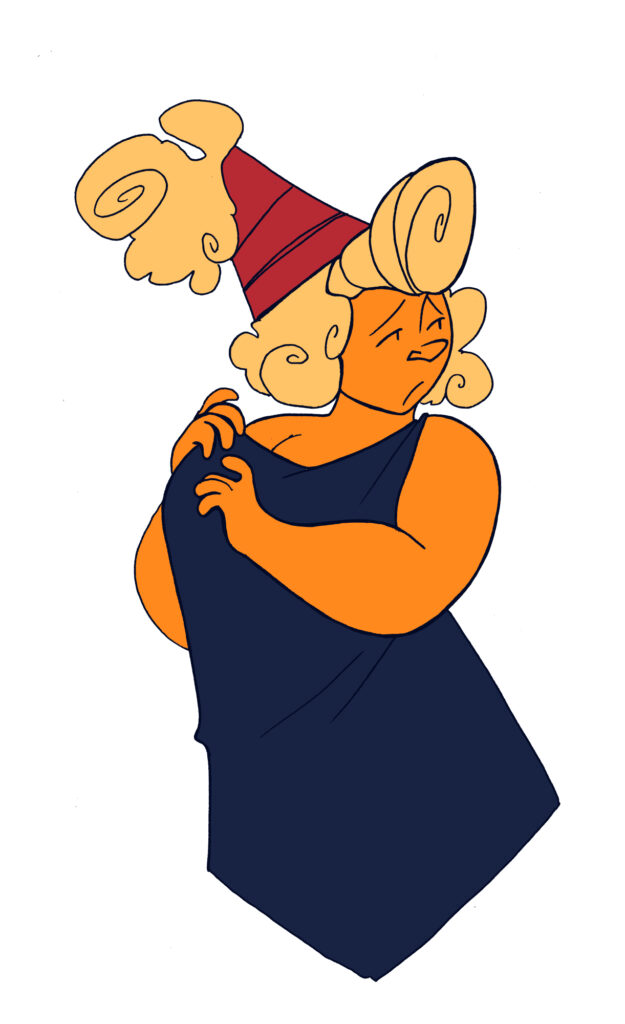
epione
(EPIONE)
Best known for being the goddess of the soothing of pain.
In some versions of the myth, while Epione was not a very prominent figure, she was worth mentioning as having a story not filled with strife at all. It was said that Epione paired herself with Asklepius who became the god of medicine. The two birthed children: Hygieia (health/cleanliness/hygene), Aceso (healing), Aglaea (beauty/splendor/glory/beauty/magnificence), Panacea (universal remedy), Machaeon and Podalirius (surgeons in the Trojan War).
Epione and Asklepius were two deities worth worship in the way neither of them represented the horrors of man nor did they participate in the petty fights between gods.
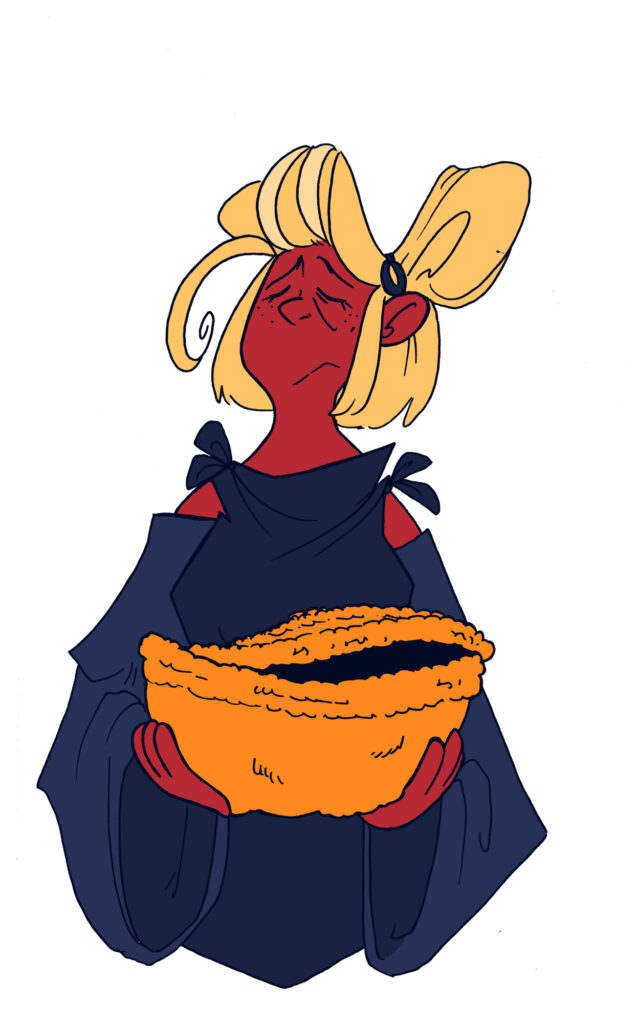
herse
(HERSE/ERSA)
Best known for being a goddess of dew.
In some versions of the myth, Herse spent most of her time with her sisters Aglauros and Pandrosos. While living a very humble life as the daughter of Zeus and Selene, setting about creating dew to nourish the plants, (or as a princess of Athens) her life changed one day when Athena approached Herse and her sisters. Athena handed them a wicker basket with her own child in it and asked them to watch over it, pressing that they were not to open it under any circumstance.
While the three sisters agreed with this, the passage of time led to insatiable amounts of curiosity about what lay inside this basket. Both Herse and Aglauros decide to open the basket for the smallest of peeks to fine a child entwined with a snake. This image, haunting both sisters, rendered them so mad they tossed themselves off a cliff.
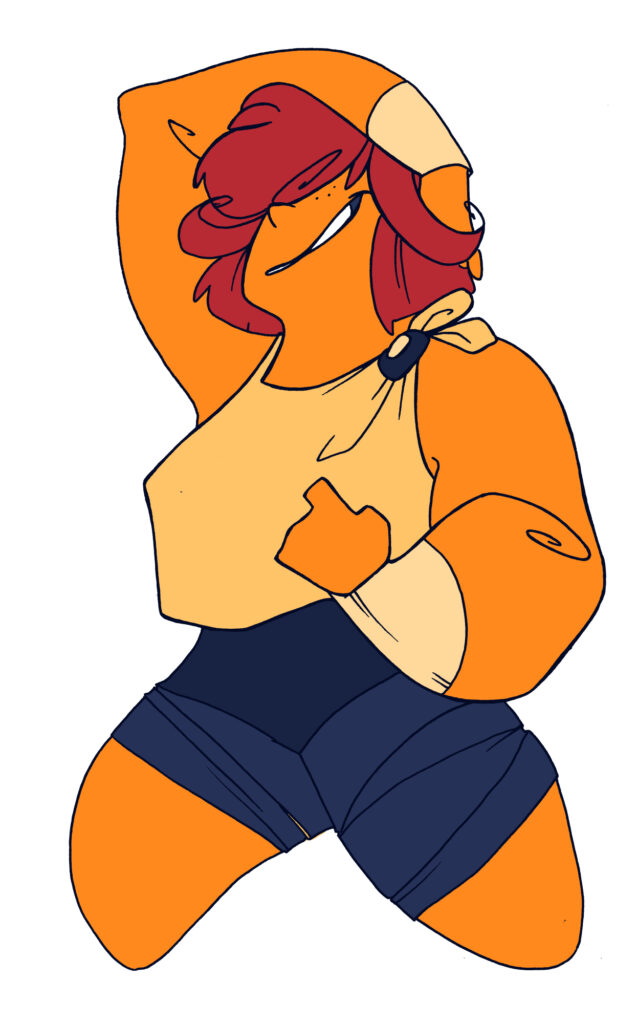
palestra
(PALAESTRA)
Best known for being the goddess of wrestling.
In some versions of the myth, she was Hermes’ consort. She spent so much time watching her brothers play this wrestling sport and passed this idea on to Hermes who was so enthralled with it he spread it throughout the land. Palaestra’s father wasn’t too pleased with the whole plagiarism and was quite miffed about it actually.
In another version she was the daughter of Hermes and the goddess of wrestling because she invented this sport in order for mortals to entertain themselves in times of peace. She was seen as pretty amazing and perhaps the most professional wrestler. She was often depicted as quite androgynous due to her boyish ways and love for the sport. Her name was also a derivative of the Greek word for ‘wrestling’.
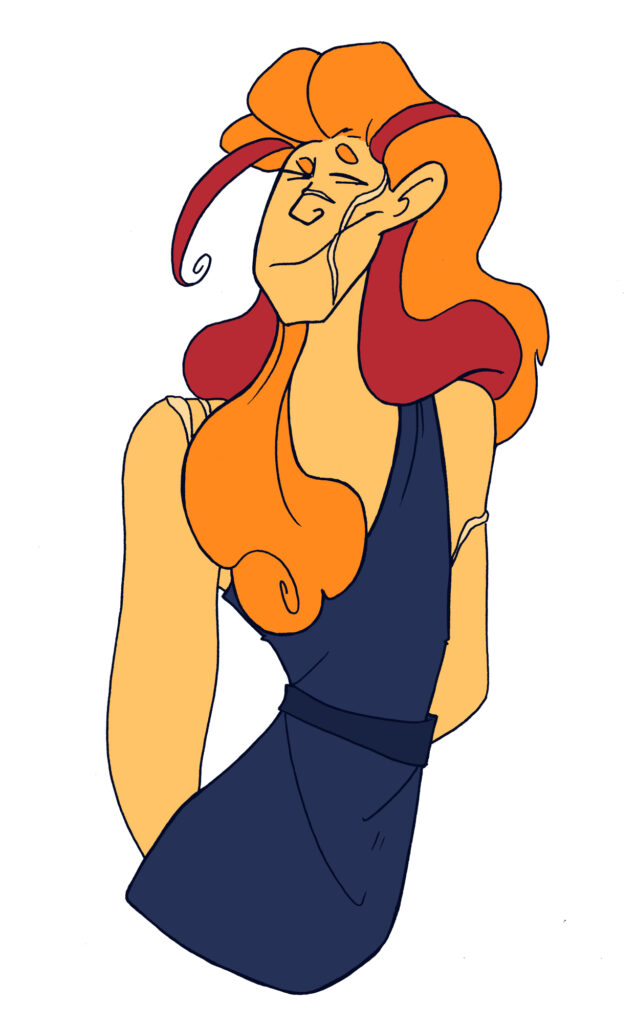
otrera
(OTRERA)
Best known for being the founder of the amazons.
In some versions of the myth, Otrera played a pretty important role in that she was not only known as the founder of the Temple of Artemis but also as the first founder of the amazon nation. She was the mother of: Hippolyta, Antiope, Melanippe and Penthesilea. It was said that she had these children with Ares who also asked Otrera to sacrifice horses to his temple (a rock he made fall from the sky). Otrera obliged.
Admittedly, however, amazonian women were a trait of mythology far before even Greek Mythology came to be. Otrera was Greek ancients’ attempts at claiming the invention of a nation of strong independent women who fought for themselves.
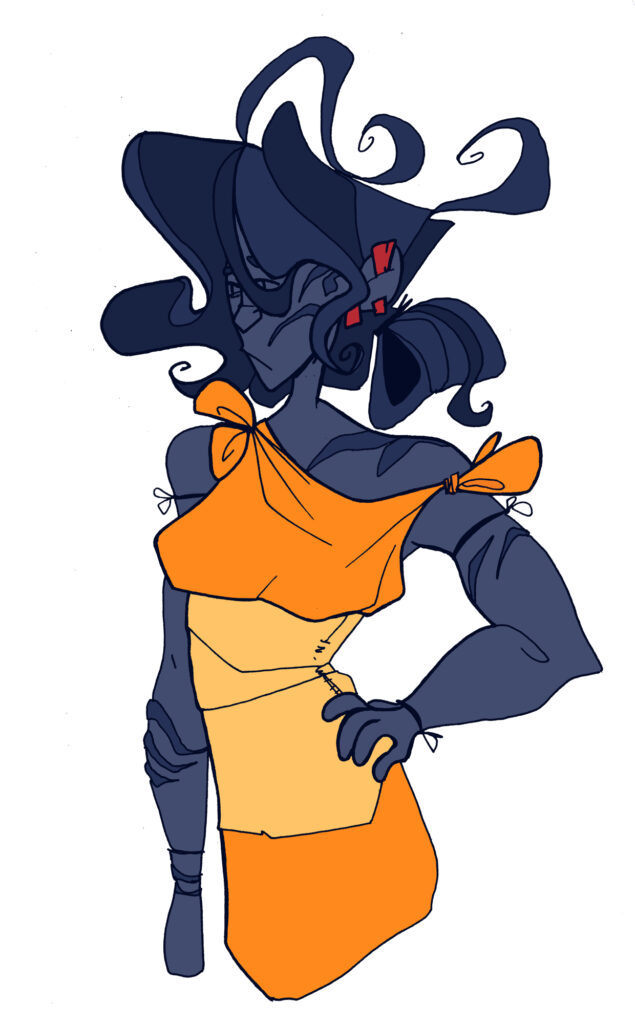
hyppolita
(HIPPOLYTA/HIPPOLYTE)
Best known for being one of the most important Amazonian Queens.
In some versions of the myth she was the daughter of Ares (who was extremely supportive of his daughter) and also played part in the ninth labour of Heracles’ twelve. Impressed by Herakles enormous muscles and his determined demeanour, Hippolyta decided to give Herakles her girdle so that he could take it back to the king he was serving the labours for and count this labour as completed.
Unfortunately things weren’t so simple and Hera cause herself a scene, disguised as an amazon, she exclaimed that Hippolyta was being kidnapped by Herakles. A small war ensued in which the amazons attacked Herakles and his men in order to save their Queen. In the chaos and the mess Hippolyta was killed.
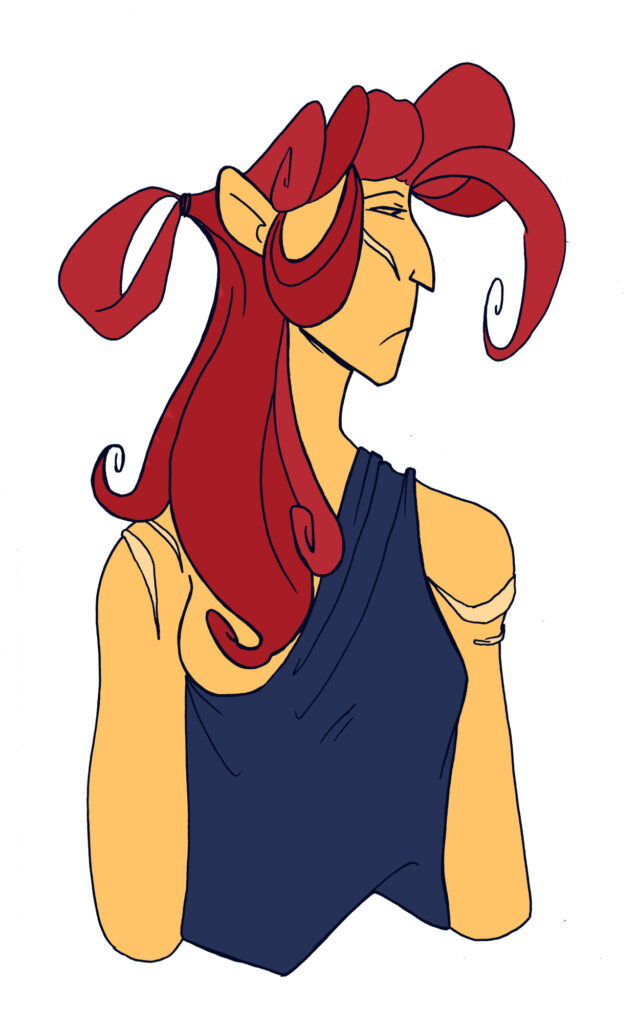
penthesilea
(PENTHESILEA/PENTHESILEIA)
Best known for being an Amazonian Queen.
In some versions of the myth, she was the sister to Hippolyta, Antiope and Melanippe which was a pretty impressive tribe of women.
Her myth began with a small hunting trip with her sister Hippolyta. While hunting deer, Penthesilea accidentally slew her sister with a spear. Wrought with so much grief, Penthasilea only wished to die but the amazon code of honour refused her the right to her own death (put simply: she could not toss herself off a cliff). In a proper honourable fashion she would have to be killed in battle and so jumped at the chance to battle in the war on Troy (taking her place with the Trojans against the Greeks). She rather unfortunately died at the hand of Akhilles.
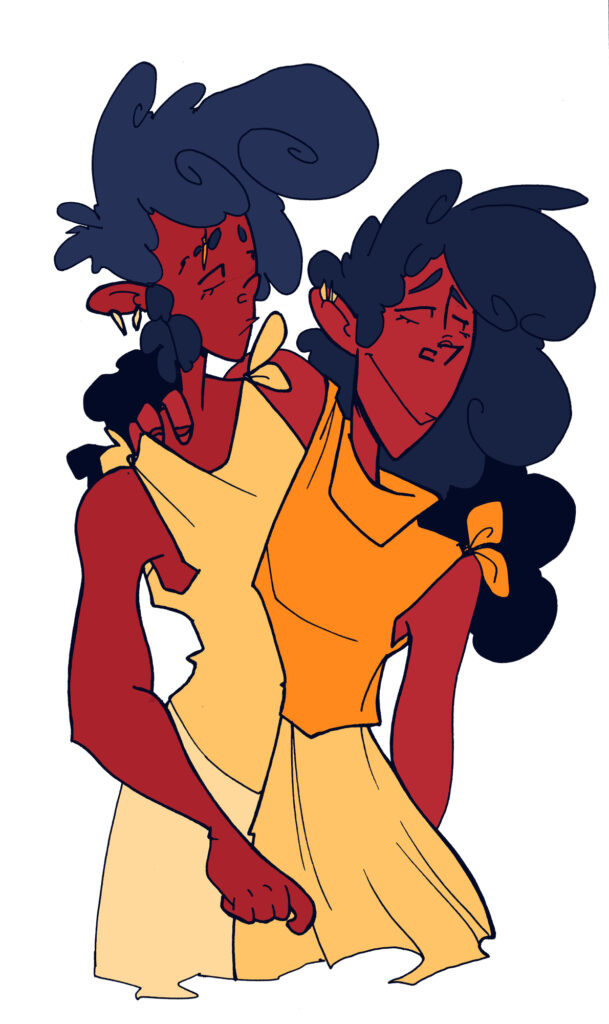
antiope & Melanippe
(ANTIOPE) & (MELANIPPE)
Best known for being amazon sisters.
In some versions of the myth it was said Antiope was one of the only amazons to have married and she married Theseus. There was some ambiguity as to if he kidnapped her or if she was kidnapped by Herakles and handed off to Theseus.
However, she and Theseus lived pretty decently in Athens until an amazonian war broke out. She was shot down by an amazon and then Theseus shot the amazon who killed her.
In Melanippe’s case, and in some versions of her myth she was captured by Herakles as a ransom for obtaining Hippolyta’s girdle. Melanippe was responsible then, for causing a mutiny on one of Herakles’ ships and freed not only herself and the amazons on board but also mad an effort of stealing his supplies.
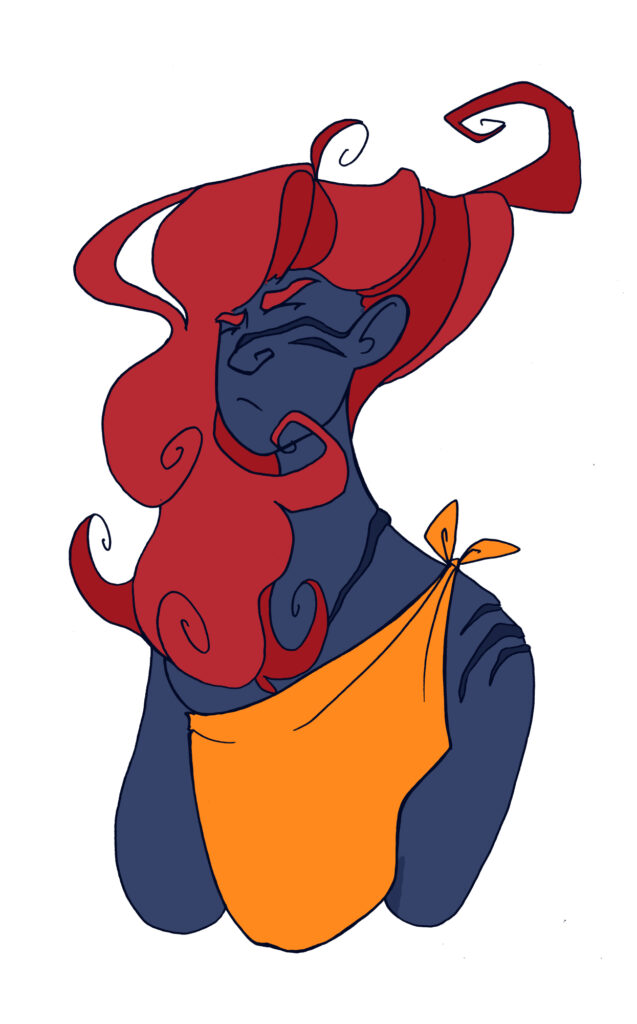
antianeira
(ANTIANEIRA)
Best known for being an Amazonian Queen.
In some versions of the myth, Antianeira was known for a few small roles including the fact that she was the mother of one of Apollo’s children and the mother of one of the Argonauts.
Antianeira’s most prominent (arguably her best) role, was being the successor to Penthesilea for the throne of Amazonian Queen. Even more interesting, with her particular ruling of the amazons was that she ordered for her male servants to be maimed because she insisted that they were far better lovers that way. Their fear of greater pain perhaps made them more willing to bend to her will.
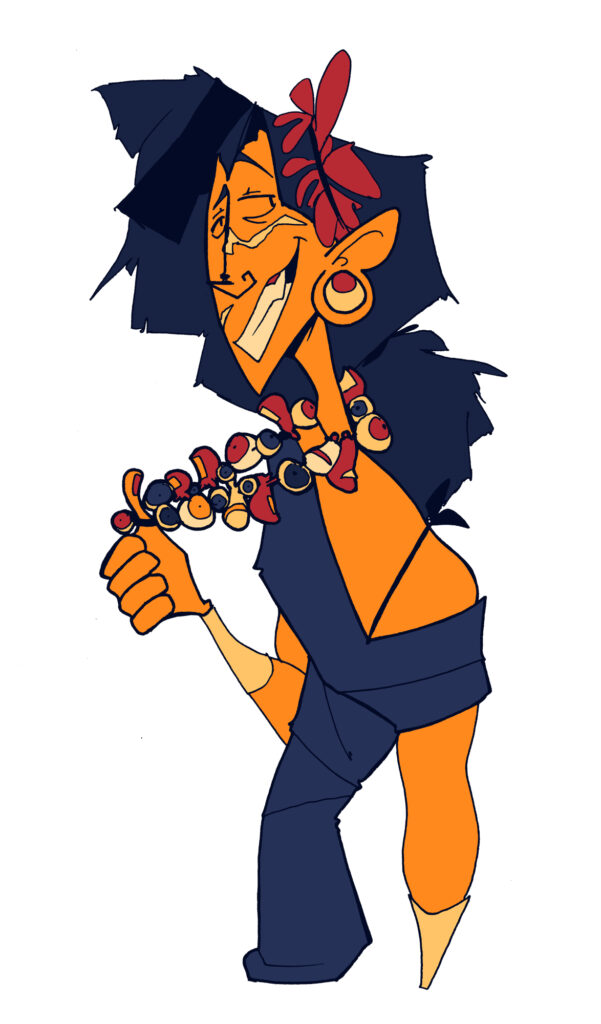
valaska
(VALASCA)
Best known for being a little bit mad.
In some versions of the myth, Valaska was a rather underrated character in Greek Mythology due to the fact that she was quite a vicious tyrant. In Valaska’s rule as Amazonian Warrior Queen, she was known to have cut off all the eyeballs and thumbs from the men passing through (or residing in) their camp. This would make them useless in battle due to the fact that they would have no means of holding their weapons or being capable of aiming with only one eye.
Valaska was only known for having a very small cult of (willing?) followers which meant she perhaps also had various followers who were too terrified of her to actually stop her.
MAIN PAGE | PRIMORDIALS | TITANS | GODS | HEROES | LOVERS | MONSTERS